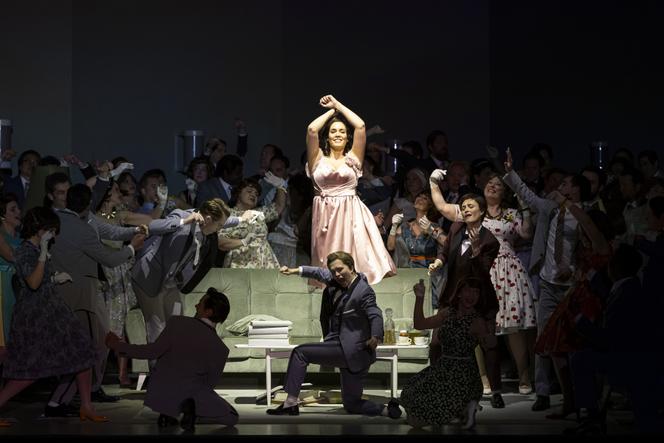
Alexander Neef, director general of the Opéra de Paris, is continuing the institution's reconquest of the French repertoire. At Bastille until June 11, the company is presenting the rare Don Quichotte (1910) by Jules Massenet (1842-1912), an opera whose knight of the woeful countenance, then played by José Van Dam, had not ridden Rocinante since 2002 in Gilbert Deflo's staging. The composer of Manon and Werther often mixed love and melancholy. This time, as in Cendrillon, he added fantasy and the memory of a marginal and painful youth, between loneliness and harassment, which the mature man, sick and depressed, relives with the help of swallowed pills and glasses of alcohol.
Director Damiano Michieletto has set up his Don Quixote in a vast, sober 1960s apartment, with almond-green furniture and white walls whose sliding back panels act as a focal point, opening onto the outside world (in fact, Don Quixote's inner world) or closing in on the hero's daily life, revisited by ghosts of a past where the star of Dulcinea, the impossible love of his youth, still shines brightly.
The great strength of this production is the absence of any Spanish decorum (even if the music does feature guitar and castanets at times), save for the troupe of flamenco dancers in traditional costumes, completely veiled in black, whose silhouettes seem to emerge from the realm of shadows. Another phantasmatic allusion is Dulcinea's lovers (partygoing students and stalkers in blazers), then the robber brigands (young thugs armed with knives, wearing jeans and black jackets), emerging from the chest of drawers, the carpet, the sofa and the bookcase.
Voluptuous Dulcinea
Michieletto's direction is lively, tightly wound and at times prone to mannerism. Such is the case with the slow-motion dance movements that blur the action between dream and reality, distilling both poetic moments of suspension and annoying systematizations in the treatment of choruses (choreography by Thomas Wilhelm). Paolo Fantin's pared-down, elegant set opens onto the underside of a vast spiral staircase (symbolic of the psyche), under Alessandro Carletti's elegant lighting, with Agostino Cavalca's colorful, yéyé-inspired costumes: Dulcinée's apple-green twin-set in Act 1 is transformed into a provocative pink prom dress. The only equine evocation is that of a superb carousel of wooden horses, brought down from the hangers, on whose back rises a tender, childlike musical-comedy Dulcinée.
The bass Ildar Abdrazakov was initially announced for the title role. But the Russian singer's openly pro-Putin stance forced the Paris Opera to revise its casting. American Christian Van Horn (to be succeeded in June by Gabor Bretz) lends the mineral darkness of his voice to the knight errant from the novel by Miguel de Cervantes (1547-1616). Power blends with vulnerability. The voluptuous, fresh Dulcinea of Gaëlle Arquez, a French mezzo who has been successfully pursuing her career on our national stage since 2012, has everything to seduce: poise, charm, coquetry but also compassion and gentleness. Etienne Dupuis' Sancho is a magnificent role of a heavenly coward with a compassionate soul. Don Quixote dies in Sancho's arms, as well as in the armchair where the hidalgo is first found when the curtain rises, with a shady pen and tormented soul, writing his picaresque tale.
You have 26.08% of this article left to read. The rest is for subscribers only.